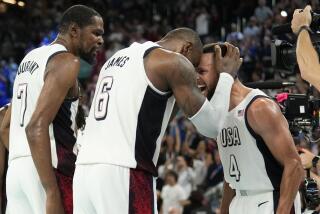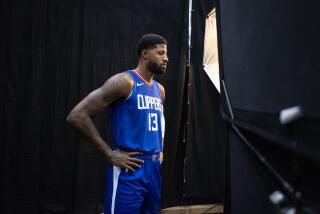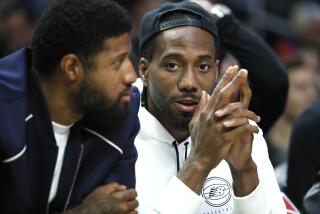Disparity Is the Hot Topic With Players
- Share via
LAS VEGAS — Michael Olowokandi stood at one end of a casino hallway and talked about money and what he hopes is a bright future as the NBA’s No. 1 draft pick.
Michael Cage stood nearby and talked about the future, too--one of an NBA that he believes increasingly won’t have room for guys like him.
“There’s no reward for a guy who works his way up the salary chart,” said Cage, a 14-year NBA veteran. “Right now we don’t have a middle class in the NBA.”
The disparity between the haves and have-nots in the NBA was something players wrestled with Thursday even as they met at Caesars Palace to discuss strategy and show a unified front in a lockout that has already cost the league part of its regular season.
Among the haves--assuming the lockout is settled sometime in the near future--will be Olowokandi, who stands to make millions even before he scores a point for the Clippers.
Cage, though, was concerned more about the have-nots--the players from the fourth through 12th spots on a typical NBA team who have increasingly seen their salaries suffer as the league pays top dollar to its top few players.
Cage and others are afraid that situation could get even worse if a tight salary cap is imposed.
“We have no $2.6 million [a year] player right now,” Cage said. “They’ll make sure their best players get the most if there is a salary cap. The rest of will be paid the NBA minimum.”
The lockout has already cost the 36-year-old Cage, now a backup center for the New Jersey Nets, 1/12th of his salary for the upcoming season. Since it will be his last season in the NBA, the impact is felt even more.
“A lot of guys like me lose a lot,” Cage said. “For guys like me, losing that money is a big hit. I’ll never get it back.”
Still, Cage, an articulate union activist, was one of more than 200 NBA players who gathered at Caesars Palace because, he said, he wants to make a difference for the players who follow him.
“It’s not for guys like me who are on our way out,” he said of the labor dispute. “I may lose out but I’m OK with that because the sacrifice is there. I’ve been a team player all my career and I want to make sure nothing is done here that upsets the balance.”
The stakes are much different for Olowokandi, the 7-foot-1 Nigerian who was the surprise top pick in the 1998 draft out of the University of Pacific.
Olowokandi was at the meeting with his agent, eager to support his fellow players but also concerned about any attempts to extend the number of years that salary caps are placed on draft picks.
Like Cage, though, the issue of the players in the middle was important.
“The Charles Barkleys, Patrick Ewings and Michael Jordans have all kinds of money,” Olowokandi said. “The guys in the median don’t have guaranteed contracts. A hard salary cap would hurt them the worst.”
Olowokandi, like most of the players at the meeting, has been working out and playing some organized basketball. Unlike the others, though, he wasn’t terribly concerned about the possibility that an entire season might be canceled.
“I just got out of college so I can hang out another year with no pay,” he said. “I can live my life like I lived it a year before or the year before that. I haven’t had any money so it’s not that big of a deal.”
Mario Elie, the Houston Rockets’ free agent forward, said he is just getting impatient waiting to know what will happen to his career.
“I’m officially free so I can’t do nothing now,” Elie said. “I just got to wait. But I know I want something fair. That’s the bottom line.”
More to Read
Go beyond the scoreboard
Get the latest on L.A.'s teams in the daily Sports Report newsletter.
You may occasionally receive promotional content from the Los Angeles Times.










